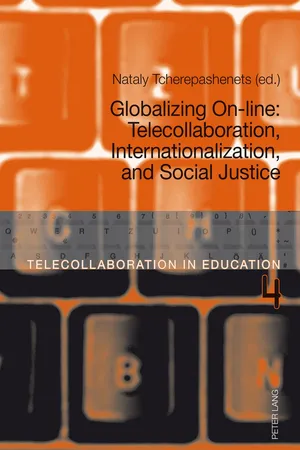
- 264 pages
- English
- PDF
- Available on iOS & Android
About this book
Internationalization plays an important role in shaping the philosophy and practice of higher education, and it is arguably one of the most durable University achievements. Offering creative ways to achieve a shift from isolation to communication between people of different economic, cultural and ethnic backgrounds, telecollaboration exemplifies challenges and rewards of internationalization in the epoch of e-learning. In our interconnected world the tasks of both bringing the equality of opportunities and promoting intercultural dialogue continue to be priorities for education, whose major objective and obligation is an expansion of the freedoms of human beings. In the era of globalization, its fulfillment more than ever depends on making it possible for people of different backgrounds to participate in intercultural dialogue on equal terms. Intercultural collaborations in virtual environments offer unique opportunities for the realization of this goal. This book explores both a contribution of telecollaboration to the democratic education, solidarity and social justice in the globalized world as well as the complexities and challenges that arise from attempts to align international collaborations and social justice.
Frequently asked questions
- Essential is ideal for learners and professionals who enjoy exploring a wide range of subjects. Access the Essential Library with 800,000+ trusted titles and best-sellers across business, personal growth, and the humanities. Includes unlimited reading time and Standard Read Aloud voice.
- Complete: Perfect for advanced learners and researchers needing full, unrestricted access. Unlock 1.4M+ books across hundreds of subjects, including academic and specialized titles. The Complete Plan also includes advanced features like Premium Read Aloud and Research Assistant.
Please note we cannot support devices running on iOS 13 and Android 7 or earlier. Learn more about using the app.
Information
Table of contents
- Cover
- Contents
- Series Editors’ Preface
- Acknowledgements
- Notes on Contributors
- Introduction (Nataly Tcherepashenets)
- Part I: Telecollaboration as a Practice of Inclusion
- Part II: Web 2.0 and Social Change
- Part III: Intercultural Encounters as Transformative Experiences
- Conclusion (Nataly Tcherepashenets)
- Index